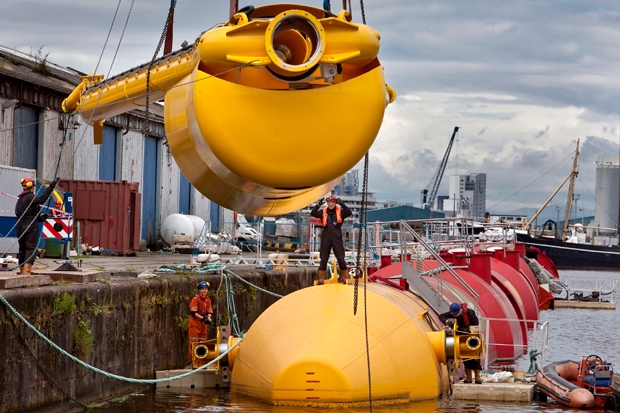The surface of the sea is a hostile and unforgiving place. Although it covers 71 per cent of the planet, nothing much bigger than a speck lives there. Obviously, lots of slimy and scaly things swim around beneath the surface — but on the very top, pretty much zilch. Mother Nature has found niches for life in the desert, the Arctic and deep underground but, after 4.5 billion years of trying, she is passing on the surface of the sea, thanks all the same.
Now you would think that this very long experiment in trying to evolve life in a hostile environment would act as some kind of hint to the nice people at the Department of Energy and Climate Change (DECC). You would think — if Mother Nature cannot persuade even a simple plant to make its home there, then what chance does a lowly civil servant have?
You would think that given this, DECC would focus its subsidy efforts on the proven technology of solar panels, wind turbines and reducing waste at energy plants. You would think all of these things, but you would be wrong.
Against all the evidence, DECC has decided that the surface of the sea is just the place to build power stations, and is cheerfully spending millions of pounds of taxpayers’ money trying to make this work.
I suspect the reason the department is so fixated on this is that 10 per cent of the UK’s base energy needs are potentially available in the waves of the North Atlantic as they crash onto our shores. To turn that potential into reality, DECC is allocating an enormous subsidy of five Renewable Obligation Certificates (ROCs) per hour for wave energy. This is the equivalent of about £220 for every hour of electricity produced. The equivalent subsidy for boring ground-mounted solar is £61.
Despite the size of this carrot, industry is still not really biting when it comes to wave energy. There are a few stalwarts trying to make power with weird snake-like things bobbing around on the surface, but the big boys of the engineering world are steering well clear. Making profitable electricity in a salty, wet and windy environment that constantly moves up and down is not the easiest engineering challenge in the world and maybe it’s best if somebody else has a go first.
However, despite the reluctance of most of the world’s engineering industry to play ball, DECC ploughs on and are now developing the snappily titled Marine Energy Array Demonstrator (Mead). In essence, this is a government-funded initiative where you get to prove that your bobby wave thing really can survive for long periods on the surface of the sea. Trust me. Honestly it will.
I think this illustrates two things. The first is that despite its neoliberal protestations, the government and its civil servants still believe that, for most problems, the state knows better than the market. Here is a situation where both nature and industry are saying this won’t work, but the state thinks it will, so we taxpayers are being asked to back a hunch. DECC may protest and talk about acting as a provider of development capital, all those platitudes, but fundamentally the department is saying it doesn’t believe that markets are canny enough to spot the opportunity — and Whitehall is. Such hubris is the starting point for wasting a lot of money. If you could make profits from the surface of the sea, then the private sector would have begun to do so a long time ago. That’s what markets do: spot opportunities, develop technology and make money.
The second thing is how dependent the renewables industry has become on subsidy. The government recently commissioned a report on wave power, and one of the most consistent messages coming from the market was that more subsidy was needed. Just one more ROC per hour, then we will all be OK.
This is not just a criticism of wave power technologies, it pervades a lot of the more marginal renewable technologies currently being developed. Whenever DECC issues a consultation paper on energy, industry representative groups clamour like birds in a nest to receive the juicy subsidy worms. The more mature technologies like wind and solar have long outgrown this dependency, but their less mature siblings know they must continue to receive DECC’s largesse in order to survive.
So despite the apparently huge potential beating in on our shores, I am pretty sure that wave power is not going to transform this country into the Saudi Arabia of western Europe. Blackpool is not going to look like Riyadh any time soon. The surface of the sea remains the least hospitable place on the planet to do anything, and all the well–intentioned but misguided state intervention in the world is not going to change that.






Comments